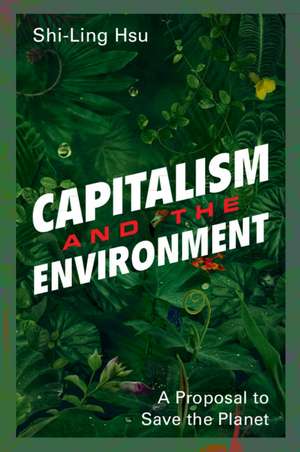Capitalism and the Environment: A Proposal to Save the Planet
Autor Shi-Ling Hsuen Limba Engleză Paperback – 8 dec 2021
| Toate formatele și edițiile | Preț | Express |
|---|---|---|
| Paperback (1) | 266.37 lei 6-8 săpt. | |
| Cambridge University Press – 8 dec 2021 | 266.37 lei 6-8 săpt. | |
| Hardback (1) | 698.13 lei 6-8 săpt. | |
| Cambridge University Press – 8 dec 2021 | 698.13 lei 6-8 săpt. |
Preț: 266.37 lei
Nou
Puncte Express: 400
Preț estimativ în valută:
50.97€ • 55.54$ • 42.95£
50.97€ • 55.54$ • 42.95£
Carte tipărită la comandă
Livrare economică 23 aprilie-07 mai
Preluare comenzi: 021 569.72.76
Specificații
ISBN-13: 9781108465526
ISBN-10: 1108465528
Pagini: 400
Dimensiuni: 152 x 228 x 13 mm
Greutate: 0.37 kg
Editura: Cambridge University Press
Colecția Cambridge University Press
Locul publicării:New York, United States
ISBN-10: 1108465528
Pagini: 400
Dimensiuni: 152 x 228 x 13 mm
Greutate: 0.37 kg
Editura: Cambridge University Press
Colecția Cambridge University Press
Locul publicării:New York, United States
Cuprins
I. Introduction; 2. How capitalism saves the environment; 3. Capital investments create their own political economy; 4. Bloated capital: how capitalism went awry; 5. The case for environmental taxation; 6. What should be taxed?; 7. Generating environmental knowledge; 8. Looking before leaping; 9. Conclusion.
Recenzii
'Capitalism and the Environment proposes nothing less than a dramatic transformation of our existing economic system in support of a more sustainable future. At the heart of Professor Hsu's vision of transformed capitalism lies a structure of environmental taxes meant to: make polluters pay for the harm they cause, create incentives for environmental care, spur innovation, unleash entrepreneurial energy, and flow capital toward environmental restoration. Sweeping in scope with penetrating insights in every chapter, Capitalism and the Environment is essential reading for anyone who cares about moving our planet onto a sustainable trajectory.' Dan Esty, Hillhouse Professor of Environmental Law and Policy, Yale University, and editor of A Better Planet: 40 Big Ideas for a Sustainable Future
'Modern environmental problems are frequently offered as one of the most common critiques of capitalism. But here, Shi-Ling Hsu argues convincingly that financial incentives delivered through price signals - one of the fundamental forces of capitalism - provide the best solution to challenges usually associated with atmospheric physics or toxic chemicals. Hsu provides an expansive view of how taxation can be used against key environmental challenges. Even if you disagree with the need to tax carbon, cows, or water consumption, this book offers a provocative view of a world made better by different incentives. Correctly guided, capitalism can deliver a prosperous and sustainable future.' Jerry Taylor, President, Niskanen Center
'In this important and informative book, written in the shadow of potentially disastrous climate change, Professor Hsu explains why an enlightened capitalism represents our best chance to restore environmental wellbeing. He argues that conventional unenlightened capitalism can slide into rigid protection of the status quo as well as wildly excessive overuse of seemingly 'free' environmental resources. But Hsu also shows how prudent and creative countermeasures, particularly well-designed environmental taxes, can correct these deviations and restore capitalism to its appropriate qualities of nimbleness, innovation, and balanced resource use.' Carol Rose, Gordon Bradford Tweedy Professor Emeritus of Law and Organization, Yale Law School
'Professor Shi-Ling Hsu, a prolific and highly influential environmental law scholar, has produced an important book on how to address environmental crises. The public policy community will need to take seriously his argument that a market-based economy has appropriate tools to confront these serious problems, by taxing pollution, generating environmental knowledge, and thinking deeply about possible consequences before undertaking investments with long-term impacts. Professor's Hsu clear and dispassionate analysis should also help bridge some gaps in our divided polity.' Richard L. Revesz, AnBryce Professor of Law and Dean Emeritus, New York University School of Law
'Modern environmental problems are frequently offered as one of the most common critiques of capitalism. But here, Shi-Ling Hsu argues convincingly that financial incentives delivered through price signals - one of the fundamental forces of capitalism - provide the best solution to challenges usually associated with atmospheric physics or toxic chemicals. Hsu provides an expansive view of how taxation can be used against key environmental challenges. Even if you disagree with the need to tax carbon, cows, or water consumption, this book offers a provocative view of a world made better by different incentives. Correctly guided, capitalism can deliver a prosperous and sustainable future.' Jerry Taylor, President, Niskanen Center
'In this important and informative book, written in the shadow of potentially disastrous climate change, Professor Hsu explains why an enlightened capitalism represents our best chance to restore environmental wellbeing. He argues that conventional unenlightened capitalism can slide into rigid protection of the status quo as well as wildly excessive overuse of seemingly 'free' environmental resources. But Hsu also shows how prudent and creative countermeasures, particularly well-designed environmental taxes, can correct these deviations and restore capitalism to its appropriate qualities of nimbleness, innovation, and balanced resource use.' Carol Rose, Gordon Bradford Tweedy Professor Emeritus of Law and Organization, Yale Law School
'Professor Shi-Ling Hsu, a prolific and highly influential environmental law scholar, has produced an important book on how to address environmental crises. The public policy community will need to take seriously his argument that a market-based economy has appropriate tools to confront these serious problems, by taxing pollution, generating environmental knowledge, and thinking deeply about possible consequences before undertaking investments with long-term impacts. Professor's Hsu clear and dispassionate analysis should also help bridge some gaps in our divided polity.' Richard L. Revesz, AnBryce Professor of Law and Dean Emeritus, New York University School of Law
Notă biografică
Descriere
Humankind must harness capitalism, not quash it, if it wants to save itself from ecological catastrophe.
